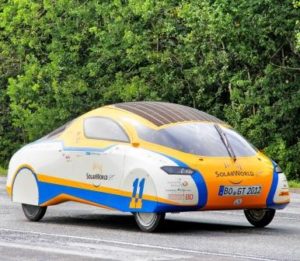
It’s a match made in the heavens – almost literally! Leading light in solar technology research Flinders University and the Bridgestone World Solar Challenge are embarking on an historic partnership to usher in a new generation of solar vehicles, via the world’s pre-eminent solar challenge event.
The organisations are delighted to announce a new sponsorship agreement that will boost the BWSC’s research strengths by harnessing the talents of the state’s leading nano-technology university.
Event Director Chris Selwood says the sponsorship agreement will be the first time in its 28 year history that a University has invested directly in the Event.
“It is a fitting, well-matched partnership in more ways than one,” Chris says.
“Along with our partners, supporters and event teams, Flinders University shares the vision of the world’s most sustainable electric vehicle becoming a reality. By utilising its cutting-edge research and development facility at Tonsley Park as a catalyst, Flinders University plans to take a leading role in that vision and to use the world’s largest solar challenge as the proving ground,” Chris says.
“A team of university faculty and student researchers will participate as a non-competitive team in 2015 event to gather data before unveiling their new vehicle in time for the 2017 event. The Flinders University Victoria Square campus will also be transformed between 18-25 October, as it becomes Event Mission Control with the perfect vantage point of overlooking the official finish line.”
As the fastest growing university in South Australia (home of the Bridgestone World Solar Challenge) the Flinders University emblem even portrays the crest of a radiant sun,” he says.
Flinders’ Executive Dean of Science and Engineering Professor Warren Lawrance says Flinders University is excited to be able to bring a new generation of solar thinking to the development of its ‘smart car of the future’.
“The BWSC presents Flinders with the opportunity to develop a prototype vehicle that we hope will go on to have widespread practical application – our ultimate vision is for a fully autonomous, driverless , solar powered vehicle to ferry passengers between our campuses” Professor Lawrance says.
“As South Australia’s hub of innovation and design, Tonsley Park is a fitting location for a new generation of electric vehicles. Its advanced technology, research and innovation has the potential to design and deliver an intelligent car of the future, which will spearhead our assault on the 2017 Challenge,” he says.
“We look forward to 2015 and beyond, with more teams, more countries, more rivalry and more innovation, it’s going to be brilliant. We hope to add even more light,” Professor Lawrance concluded.
The World Solar Challenge
The world’s biggest solar challenge began in 1987 and is an adventure that occurs once every two years. This year’s Bridgestone World Solar Challenge is the event’s 13th crossing of Australia. 46 teams from 25 countries are striving to make the Darwin start line on Sunday 18 October, in their bid to deliver the world’s most efficient electric car.
Three classes of vehicle, Challenger, Cruiser and Adventure, will take on the Aussie outback in a contest of endurance, strategy and innovation. They are united in their aim – to complete the crossing of the continent from Darwin to Adelaide, some 3000 kilometres to the south, on the power of the sun. The elite Challenger Class is conducted in a single stage from Darwin to Adelaide, with the Adventure Class enjoying a compulsory stop in Alice Springs; the unique nature of the event is that teams set up camp each night wherever they happen to be. In addition, 2015 will see the second running of the Cruiser Class, created to encourage the design of practical electric vehicles where success is judged on a range of design and performance measures.
The only certainty is that with more teams, more countries, more rivalry and more innovation, the stage is set for a total eclipse of past events and achievements.

